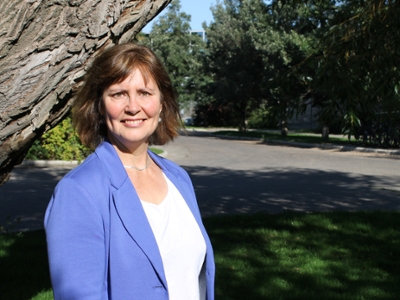
USask SENS professor to receive honour of Distinguished Professor
Dr. Maureen Reed reflects on her early work as a feminist scholar at the end of a banner year filled with awards.
By Megan EvansDr. Maureen Reed isn’t one to seek out the spotlight. “You know, we have two other Distinguished Professors in SENS (School of Environment and Sustainability). Maybe you could write about all three of us?” Reed proposed in response to the request for an interview.
Despite her resistance to public recognition, she continues on a strong track of career success in 2019 with the USask honour of Distinguished Professor coming on the heels of the Award for Scholarly Distinction from the Canadian Association of Geographers, and a nomination for Distinguished Alumni Achievement from the University of Waterloo, where she received her PhD.
“Dr. Reed is distinguished in many ways—as anyone who has worked with her will know. She is an award-winning and outstanding researcher with a strong commitment to reconciliation. She is a committed mentor and teacher. And she is an extraordinary university citizen. I was privileged to serve with such a capable and kind colleague during my five years leading SENS,” says Dr. Toddi Steelman, former SENS Executive Director, and current Duke University Stanback Dean of the Nicholas School of Environment and Sustainability.
A champion of interdisciplinary research, Reed remains grounded in the love of Geography, her home discipline. One aspect of her research program focuses on the ways in which women participate in the forestry sector. “I am a fan of the other f-word—Feminism. Early in my career, there was a belief that women would make different policy choices about protecting the environment than men because of the belief that women were more maternal, more nurturing.
“But I started to conduct research in forestry communities where women from forestry communities were on the front lines of protests against more protected areas and against increasing regulation of the forest industry in BC. Their positions were anathema to how women were supposed to act within environmental debates. I wanted to understand and give voice to their perspectives through a feminist lens. I’ve maintained an academic interest in gender and forestry issues ever since. Feminist and gender-based analysis continues to inform a lot of my work,” said Reed, who identifies as a feminist scholar.
A UNESCO co-chair in Biocultural Diversity, Sustainability, Reconciliation, and Renewal, shared with Dr. Jim Robson, Reed’s research focuses on practices of governance that support the sustainability of local ecosystems and livelihoods, and communities that rely on them. Some of her favourite work happens with people living and working in Model Forests, UNESCO Biosphere Reserves across Canada, (including Saskatchewan’s only biosphere reserve at Redberry Lake), and Indigenous communities such as Mistawasis Nêhiyawak. Her current work in the PROGRESS (PRactices Of Governance for Resilience, Environmental and Social Sustainability) lab at USask seeks to support efforts of rural and Indigenous communities to achieve sustainability by learning about the environmental, social and cultural challenges they face and working together to enhance their adaptive capacity.
As for teaching, Reed sees herself as a learning facilitator, someone who is responsible for organizing opportunities and materials so that students can direct and make the most of their own learning.
“I feel lucky to have had Maureen as a supervisor,” says former student and MWS 2019 graduate Amanda Lindgren. “She has a unique combination of incredible research expertise and mentorship skills that is quite rare. Not only does she share her in-depth knowledge of sustainability issues, but she also provides students with practical advice about the research process, getting published, and provides opportunities to work with communities and organizations outside of academia. Even though she is a world-renowned scholar and Assistant Director of SENS, Maureen really prioritizes supporting her students and I am very grateful for her guidance in completing my program.”
Given all she has accomplished and the relationships she has built to date in her career, how did Dr. Reed choose to celebrate her new title?
“Quietly,” she laughs. “I just want to say how appreciative I am.”

